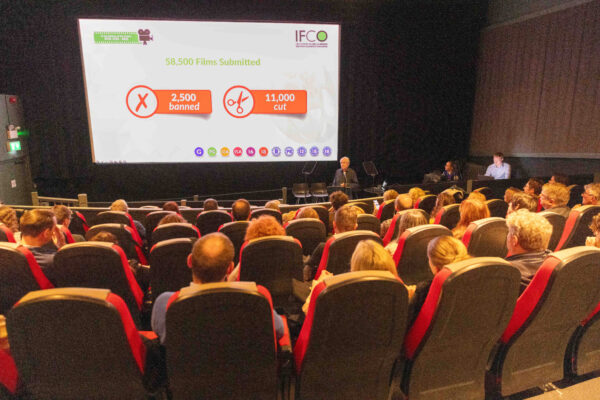From Guard Dog to Guide Dog, the Irish Film Classification Office mark 100 years of the Censorship Act
By Brian Bowe
2023 holds immense significance for the Irish Film Classification Office (IFCO), the organisation responsible for examining and certifying all cinema films and videos/DVDs distributed in Ireland, as it commemorates the centennial of the Censorship of Films Act’s signing in 1923. This legislation was among the first to be enacted by the Irish Free State, leaving a lasting impact on the country’s film landscape.

The history of the Irish Film Censor’s Office offers an intriguing insight into the social, political, and cultural development of Ireland since its establishment. Over the past two decades alone, IFCO has undergone a remarkable transformation, shifting its focus from censorship to classification and providing invaluable advice and guidance to audiences regarding cinema and home entertainment offerings available in the country.
Commenting on the IFCO’s 100th anniversary, Minister for Justice Helen McEntee said: “The evolution from censorship to classification over the past 100 years in a way reflects the growing confidence of our country and the self-assured, outward-looking, and diverse society that we are today. Film classification impacts cinema fans young and old the length and breadth of the country and it is important that parents, in particular, understand the classification system.”
Events that took place over the last couple of months to mark the centenary included an in-cinema competition promoting awareness of the various film classification categories and a refreshed IFCO logo (replacing the red dot with a green one); an IFCO classification workshop on Culture Night (22nd September); and an illuminating panel discussion hosted by the Department of Justice, the National Archives of Ireland and IFCO which took place in the Irish Film Institute this past November.
In addition to looking at the evolution of film censorship/classification over the last 100 years, the discussion event, chaired by RTÉ presenter and producer Kay Sheehy, signalled the start of a process to transfer remaining IFCO records to the National Archives. These records comprise the individual decisions on films reviewed by IFCO and its predecessors, and those subject to appeals to the Classification of Films Appeals Board.
Panellists on the night ranged from former IFCO director, John Kelleher; film historian Professor Ruth Barton; Vice President and General Manager of Walt Disney Ireland, Trish Long; and Dr Ciarán Kissane, appointed as Director of Film Classification of IFCO last spring.
Kelleher and Barton both offered well-prepared and often-humorous lectures detailing the fascinating history of film censorship in Ireland. The 1923 Censorship of Films Act prescribed the prohibition or alteration of films deemed “indecent, obscene or blasphemous,” as well as those that were considered to be contrary to public morality or subversive.

Over 50,000 film censorship rulings have been issued to date, resulting in approximately 2,500 theatrical films being banned outright and around 11,000 being subject to edits. However, it is worth noting that this stringent treatment was predominantly prevalent before 1965. This was partly as a result of a conservative and hysterical approach to cinema, it was also due to the fact that there was no distinction made between films for adults and children; all citizens were treated as children. The first censor, James Montgomery, famously stated that he knew nothing about films but knew the Ten Commandments and took them as his code.
Consequently, it comes as no surprise that very few films managed to escape unscathed from the censor’s grasp during this period. As a result many of the great classics, including Gone with the Wind (1939), Brief Encounter (1945), Psycho (1960) and The Graduate (1967), were drastically cut, the latter with an X-certificate and eleven cuts. The much beloved Casablanca (1942) was initially banned in Ireland due to neutrality restrictions during the Second World War. It was later passed with severe cuts on June 15, 1945. Then, in 1974, when RTÉ made an enquiry before showing the film on TV, the censor passed it with one cut: the crucial scene in which Ilsa professes her continuing love for Rick.
From the mid-1960s onwards, Irish film censorship gradually embraced more wavy-gravy policies, focusing on determining age-appropriate ratings for films. Cutting films virtually ceased under the stewardship of Sheamus Smith, the eighth Film Censor (1987-2003), and rejections diminished significantly.
Given IFCO’s long history and relatively vague criteria – open to subjective and varied interpretation – censorship has been inconsistent throughout the decades, such that one censor might ban a film which, on appeal, may be passed. The most famous example according to the panel was Monty Python’s Life of Brian (1979) which, though banned by Frank Hall in 1980, passed uncut by Smith in 1987 under the seven year rule by which a film may be resubmitted for certification.

During the 1990s, IFCO was still banning films, such as Natural Born Killers (1994) and From Dusk till Dawn (1996), from being screened. In fact, the most recent film to be banned came in 2005. Boy Eats Girl, a horror-comedy film directed by Stephen Bradley and starring Samantha Mumba was the first non-pornographic film for some years to be banned by the IFCO, due to a depiction of suicide. While the scene was not cut from the film, the appeals board later overturned the ban, issuing a 15A rating.
The present system of censorship is marked by increased receptiveness and adaptability, with a focus on treating the public as discerning consumers. Looking forward to the future, Dr Ciarán Kissane said: “Two of my priorities since then have been the development of a Strategy Statement to guide the work of IFCO in the post-pandemic period and devising a suitable programme of events to mark the centenary of the 1923 Act. In both cases, the importance of our work as a public service that must balance the right to freedom of expression with the requirement that audiences are protected from harmful and illegal content has shaped our deliberations.
“IFCO’s role in providing trusted guidance that reflects and shapes audience expectations remains the core of its activities as detailed in our first Mission statement. The Mission also identifies our focus on working with others to ensure that available content reflects the increasing diversity of Irish society and our commitment to working with others to enhance digital literacy.
Summing up the night’s panel discussion, Kissane described IFCO’s evolution over the last 100 years as “going from Ireland’s guard dog to guide dog.”



